Serving 100 students in grades 7-12, Junior-senior High At Sumner ranks in the bottom 50% of all schools in Nebraska for overall test scores (math proficiency is bottom 50%, and reading proficiency is bottom 50%).
The percentage of students achieving proficiency in math is 30-39% (which is lower than the Nebraska state average of 46%). The percentage of students achieving proficiency in reading/language arts is 30-39% (which is lower than the Nebraska state average of 47%).
The student:teacher ratio of 8:1 is lower than the Nebraska state level of 12:1.
Minority enrollment is 18% of the student body (majority Hispanic), which is lower than the Nebraska state average of 38% (majority Hispanic).
Quick Stats (2025)
- Grades: 7-12
- Enrollment: 100 students
- Student:Teacher Ratio: 8:1
- Minority Enrollment: 18%
- Graduation Rate: ≥80% (Top 50% in NE)
- Overall Testing Rank: Bottom 50%
- Math Proficiency: 30-39% (Btm 50%)
- Reading Proficiency: 30-39% (Btm 50%)
- Science Proficiency: 60-69% (Top 50%)
- Source: National Center for Education Statistics (NCES), NE Dept. of Education
School Overview
Junior-senior High At Sumner's student population of 100 students has grown by 5% over five school years.
The teacher population of 12 teachers has grown by 9% over five school years.
Grades Offered
Grades 7-12
Total Students
100 students
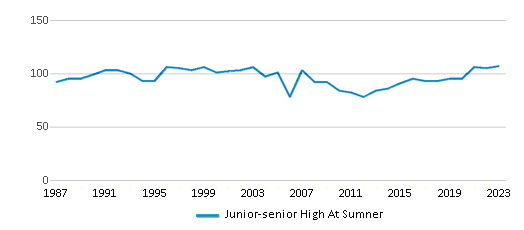
Gender %
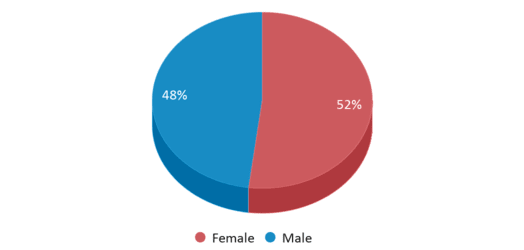
Total Classroom Teachers
12 teachers
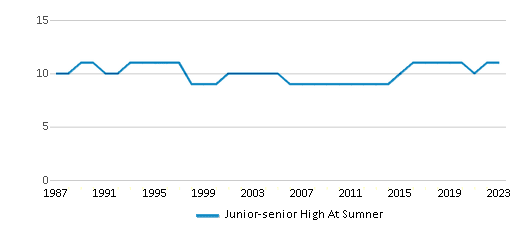
Students by Grade
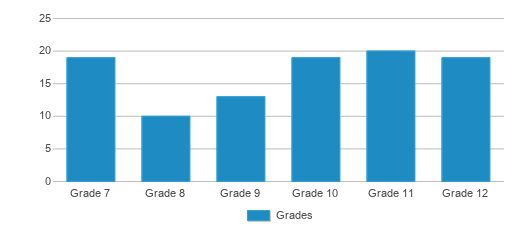
School Rankings
Junior-senior High At Sumner ranks within the bottom 50% of all 902 schools in Nebraska (based off of combined math and reading proficiency testing data).
The diversity score of Junior-senior High At Sumner is 0.31, which is less than the diversity score at state average of 0.57. The school's diversity has stayed relatively flat over five school years.
Overall Testing Rank
#718 out of 902 schools
(Bottom 50%)
(Bottom 50%)
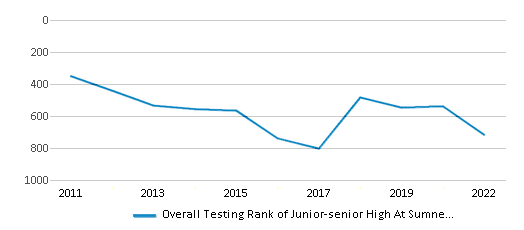
Math Test Scores (% Proficient)
30-39%
46%
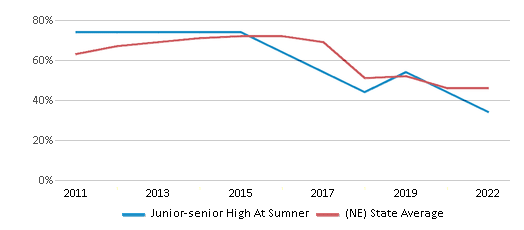
Reading/Language Arts Test Scores (% Proficient)
30-39%
47%
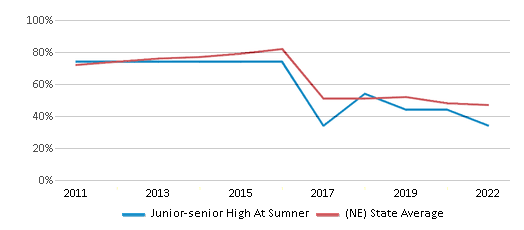
Science Test Scores (% Proficient)
60-69%
62%
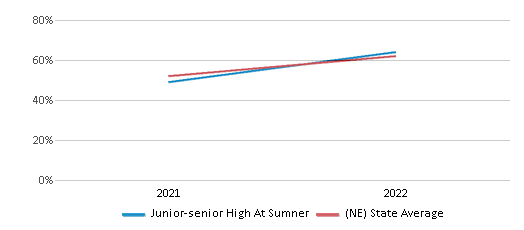
Student : Teacher Ratio
8:1
12:1
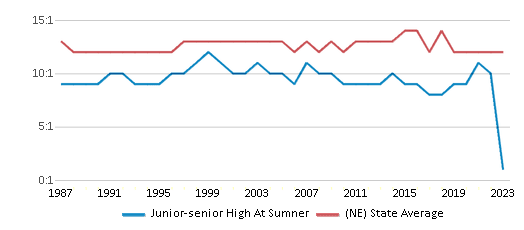
American Indian
n/a
1%
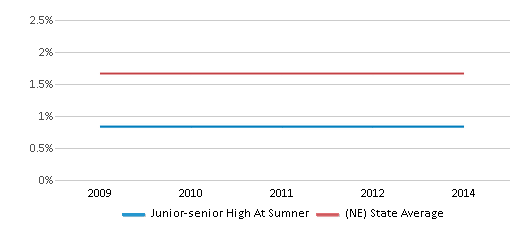
Asian
n/a
3%
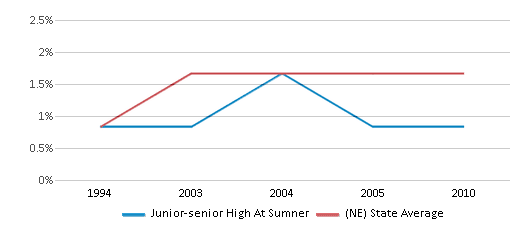
Hispanic
14%
22%
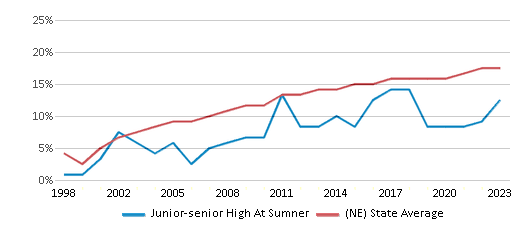
Black
2%
7%
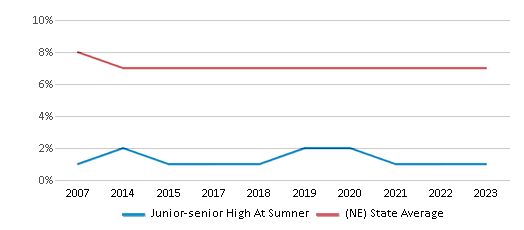
White
82%
62%
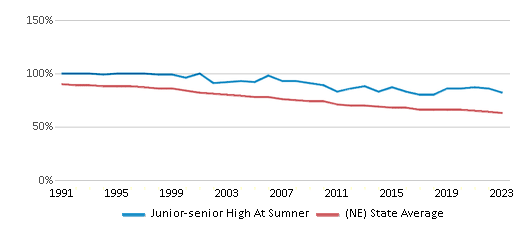
Hawaiian
n/a
n/a
Two or more races
2%
5%
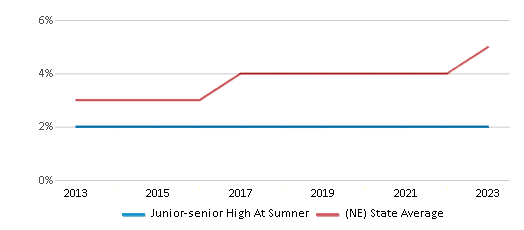
All Ethnic Groups
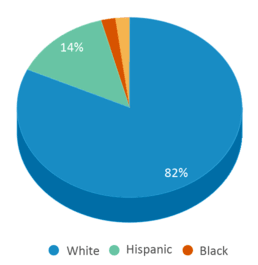
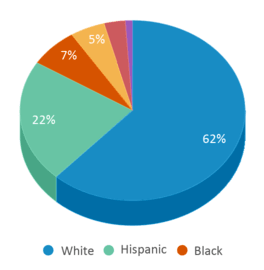
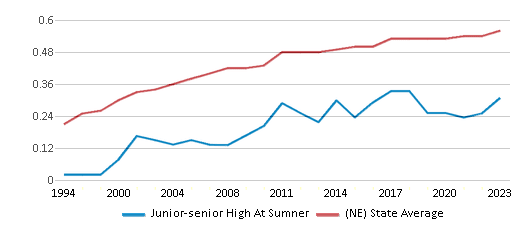
Graduation Rate
≥80%
87%
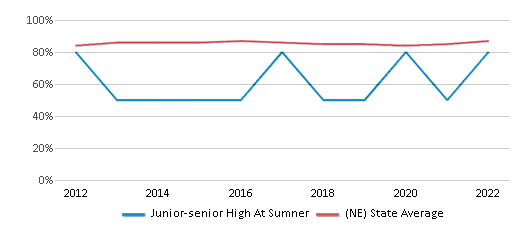
Participates in the National School Lunch Program (NSLP)
Yes
Eligible for Free Lunch
45%
38%
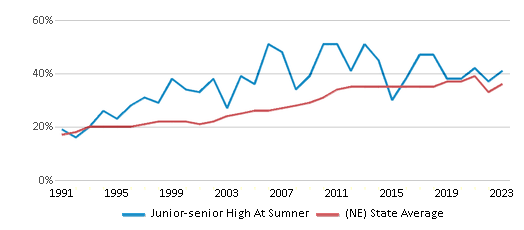
Eligible for Reduced Lunch
14%
8%
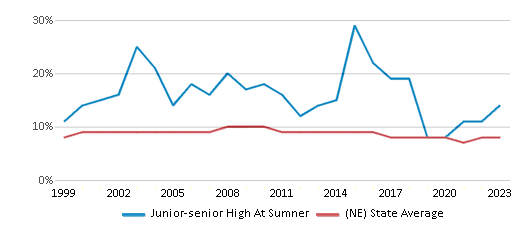
School Statewide Testing
School District Name
Source: National Center for Education Statistics (NCES), NE Dept. of Education
Profile last updated: 02/09/2025
Frequently Asked Questions
What is Junior-senior High At Sumner's ranking?
Junior-senior High At Sumner is ranked #718 out of 902 schools, which ranks it among the bottom 50% of public schools in Nebraska.
What percent of students have achieved state testing proficiency in math and reading?
30-39% of students have achieved math proficiency (compared to the 46% NE state average), while 30-39% of students have achieved reading proficiency (compared to the 47% NE state average).
What is the graduation rate of Junior-senior High At Sumner?
The graduation rate of Junior-senior High At Sumner is 80%, which is lower than the Nebraska state average of 87%.
How many students attend Junior-senior High At Sumner?
100 students attend Junior-senior High At Sumner.
What is the racial composition of the student body?
82% of Junior-senior High At Sumner students are White, 14% of students are Hispanic, 2% of students are Black, and 2% of students are Two or more races.
What is the student:teacher ratio of Junior-senior High At Sumner?
Junior-senior High At Sumner has a student ration of 8:1, which is lower than the Nebraska state average of 12:1.
What grades does Junior-senior High At Sumner offer ?
Junior-senior High At Sumner offers enrollment in grades 7-12
What school district is Junior-senior High At Sumner part of?
Junior-senior High At Sumner is part of Sumner-Eddyville-Miller Schools School District.
School Reviews
Review Junior-senior High At Sumner. Reviews should be a few sentences in length. Please include any comments on:
- Quality of academic programs, teachers, and facilities
- Availability of music, art, sports and other extracurricular activities
Recent Articles

What Is A Charter School?
Explore the world of charter schools in this comprehensive guide. Learn about their history, how they operate, and the pros and cons of this educational innovation. Discover key facts about charter schools, including admission policies, demographics, and funding, as well as what to look for when considering a charter school for your child.

10 Reasons Why High School Sports Benefit Students
Discover the 10 compelling reasons why high school sports are beneficial for students. This comprehensive article explores how athletics enhance academic performance, foster personal growth, and develop crucial life skills. From improved fitness and time management to leadership development and community representation, learn why participating in high school sports can be a game-changer for students' overall success and well-being.

February 05, 2025
Understanding the U.S. Department of Education: Structure, Impact, and EvolutionWe explore how the Department of Education shapes American education, from its cabinet-level leadership to its impact on millions of students, written for general audiences seeking clarity on this vital institution.





